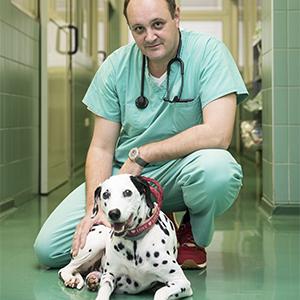Croatian veterinary surgeon Marko Stejskal, DVM, PhD, recently completed his residency at the UGA College of Veterinary Medicine and became board-certified by  the American College of Veterinary Surgeons—thanks in part to a long-standing fund that supports academic exchange and collaboration between UGA and institutions in Croatia. Now he’s a senior assistant in the Surgery, Orthopedics and Ophthalmology Clinic in the Faculty of Veterinary Medicine at the University of Zagreb.
the American College of Veterinary Surgeons—thanks in part to a long-standing fund that supports academic exchange and collaboration between UGA and institutions in Croatia. Now he’s a senior assistant in the Surgery, Orthopedics and Ophthalmology Clinic in the Faculty of Veterinary Medicine at the University of Zagreb.
Dr. Stejskal was born and raised in Zagreb and completed his undergraduate and veterinary medical studies at the University of Zagreb. He says he was inspired to pursue higher education by his grandfather, who was one of the first veterinary parasitologists in the region. Looking back on his own desire to pursue a career in veterinary medicine, Dr. Stejskal says, “I don’t remember dreaming of being anything else.”
Before he had heard of the University of Georgia, Dr. Stejskal had the opportunity in 1998 to visit the U.S. through the International Veterinary Students’ Association. This experience opened his mind to the possibility of completing a residency outside of his home country. However, programs across Europe were full years in advance. The American College of Veterinary Surgeons is an older and larger college than its European counterpart, the ECVS, and as a result, most of the residency opportunities are in the U.S.
In 2010, Dr. Sheila W. Allen, then dean of UGA’s veterinary college, visited the University of Zagreb with a delegation of other faculty and administrators from UGA; on this trip, she met Dr. Stejskal. She was impressed by his institution’s desire to further advance veterinary services in Croatia through the development of specialty training. In order to provide specialty training for veterinarians, the faculty members must be board-certified specialists themselves.
Dr. Allen worked with Dražen Matičić, deputy head of the clinic, and other administrators at the University of Zagreb to allow Dr. Stejskal to pursue specialty training—a residency in surgery at UGA which began in 2012, supported by the UGA-Croatian Program Support Fund. There was an adjustment period for Dr. Stejskal after he arrived in Athens.
“At the beginning times were hard, but it never crossed my mind that I should give up,” he says. “There were many sleepless nights.” However, he quickly developed friendships with the people he worked with on night shifts and in the emergency room at the Veterinary Teaching Hospital.
“Those are the people that I heavily relied on, mostly my fellow residents,” he says. “I certainly made some meaningful friendships while I was there.”
At the UGA CVM, surgical residents must participate in faculty-led research and publish a paper prior to taking their board certification examinations. Dr. Stejskal worked with veterinary orthopedic surgeon Steve Budsberg, DVM, MS, DAVCS, on the topic of gait analysis in dogs at a trot.
“I could not do gait analysis here in Zagreb because we do not have the facility and instrumentation to do that,” says Dr. Stejskal. “UGA’s equipment spoiled me.”
His time at UGA exposed him to an entirely new set of possibilities than what was available to him in Croatia. The residency program with the UGA CVM is intensive and challenging, but he says he was “surrounded and taught by the best of the best.” One of his most memorable cases dealt with a dog named Thor that was struck by a truck. Thor was badly injured and required intensive care in the Veterinary Teaching Hospital. Though he is not usually one to become overzealous about how “cute” his patients are, Stejskal formed an attachment to Thor.
“When you have a high-intensity case like this, you have to avoid getting too involved with just that one case,” he says. “You also have 10 or 15 other animals to care for.” In the end, Thor was released from the hospital after five weeks of recovery and today is enjoying a good life with his owners.
On the last day of his residency, Dr. Stejskal felt an overwhelming sense of accomplishment.
“I could not be happier with the program and my experience there. It was hard for me to leave,” he says. “My big hope is that we [University of Zagreb] will continue to collaborate with UGA.”
